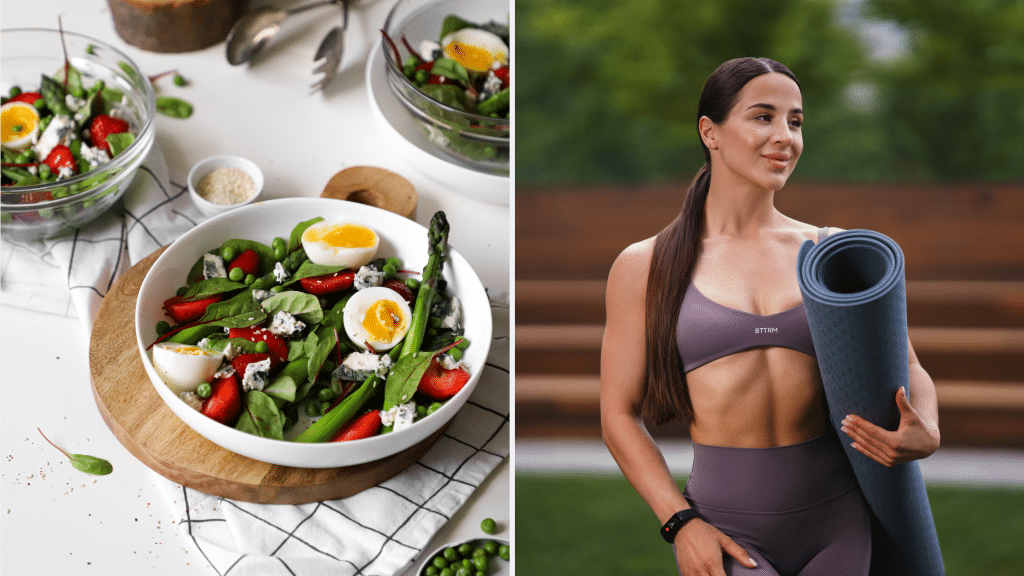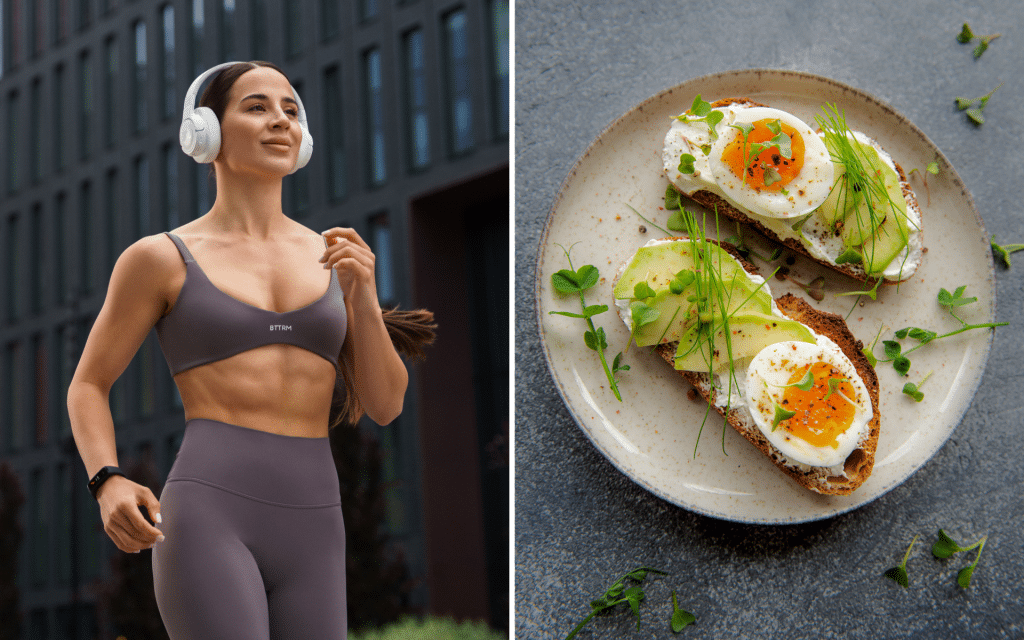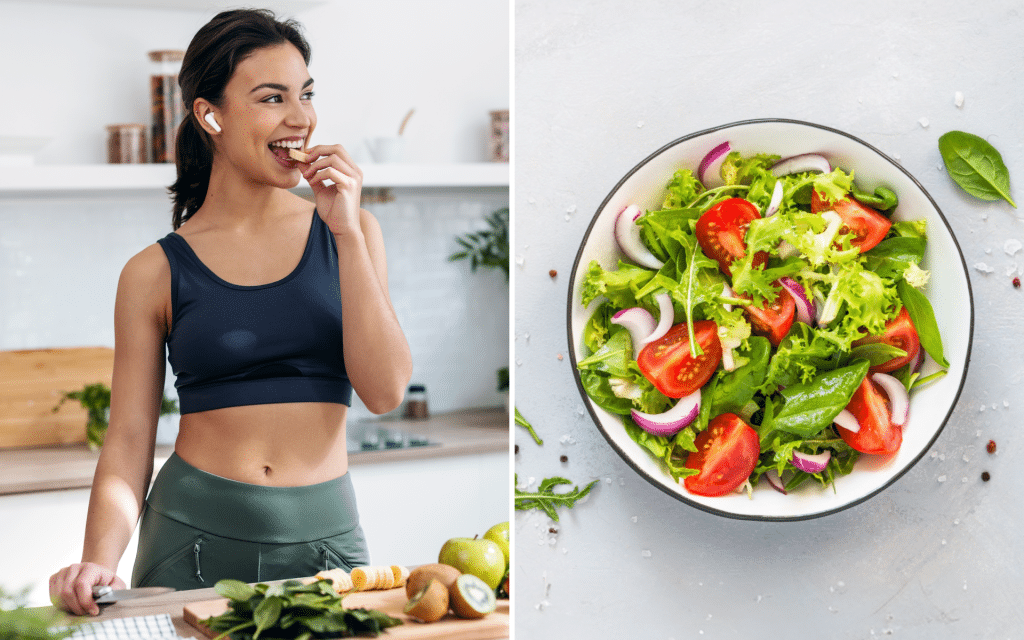Protein is one of the three essential macronutrients the body needs for energy, growth, and maintaining various bodily functions to keep you alive.
According to research, consuming the daily recommended protein intake:
- Helps you maintain lean body mass
- Provides your body with the 9 essential amino acids
- Allows you to maintain healthy food intake and body weight
- Supports optimal organ function, including muscle function (1).
Going above the recommended daily intake of this macronutrient may help prevent sarcopenia, help maintain energy balance, improve bone health and cardiovascular function, aid in wound healing (2), and could even promote weight loss.
A high-protein meal plan for weight loss female diet could benefit women hoping to shed some extra stubborn pounds. Read on to learn more about this meal plan and how to use it effectively for desired results.
What Is A High-Protein Meal Plan For Weight Loss Female?
A high-protein meal plan for weight loss female is a diet that’s relatively high in protein but low enough in calories to create a calorie deficit, which can help a woman to shed any stubborn weight that she may be struggling with.
Also known as a high-protein low-calorie meal plan, this diet requires you to:
- Eat more than the recommended daily intake of protein. i.e., instead of consuming 0.8 g of protein per kilogram of body weight a day, people often increase the intake to somewhere around 1.2-1.6 g of protein per kilogram of body weight per day (3).
- Reduce your daily average calorie intake by 500-750 calories.
- Research suggests that an energy deficit (a calorie deficit) is the most crucial factor in weight loss (4). Regardless of the type of healthy diet you choose for weight loss, as long as you create a deficit in your daily calorie intake, you should see positive results.
Remember that protein promotes weight loss through:
- Increased satiety
- Increased thermogenesis (meaning you burn a few more calories digesting this macronutrient than carbs or fats)
- The maintenance and increase of lean mass (5).
Thus, if your healthy diet consists of high-protein and balanced meals for weight loss, the higher the chances of better weight and fat loss results.
What Kind Of Protein Should A Woman Eat To Lose Weight?
When considering the best sources of this macronutrient for high-protein recipes for weight loss, a woman should ideally opt for a combination of lean animal-based proteins and plant-based proteins.
Healthy, highest protein meat options include:
- Skinless chicken
- Turkey breast
- Lean cuts of beef: Sirloin or round.
- Pork tenderloin
- Fatty fish: Salmon, tuna, mackerel, etc., and other seafood.
- Eggs
- Low-fat dairy products: Greek yogurt, whey protein powders, and cottage cheese.
Plant-based sources are not exclusively for a high-protein meal plan for weight loss female vegetarian diet.
Reasons why BetterMe is a safe bet: a wide range of calorie-blasting workouts, finger-licking recipes, 24/7 support, challenges that’ll keep you on your best game, and that just scratches the surface! Start using our app and watch the magic happen.
Plant-based protein includes:
- Beans
- Lentils
- Nuts
- Seeds
- Nut butter
- Soy products: Tofu, tempeh, edamame, and soy protein isolate
Even non-vegetarians can benefit from including more plant-based protein sources in their diets alongside animal-based ones.
Note that:
- If you are vegan, you do not have to start being a meat-eater to achieve the macros for a high-protein weight loss diet. Vegans can stick to the above-mentioned plant-based options and still hit their macros.
- Other vegetarians, such as ovo-lacto or pescatarians, can follow their chosen vegetarian diet rules with the confidence that they will reach their macros.
Read more: Mastering The Basics Of A 1200 Calorie Deficit Meal Plan For Beginners
What Protein Burns Belly Fat?
There is no single type of protein that burns belly fat.
While research suggests that a higher intake of quality protein as part of a reduced-calorie diet can help to reduce belly fat (6, 7, 8, 9), science does not single out any specific type of protein, saying that it works best among all others.
As long as your high-protein and low-calorie diet contains a variety of the above-listed lean animal and/or plant-based proteins, you will lose belly fat and overall body fat, and see the scale go down.
You’ll achieve the best results if you combine this diet with at least 30 minutes of exercise, at least 5 days a week (10). An exercise routine combining cardio workouts and strength training is perfect for weight, fat loss, and muscle growth (10).
While a high-protein diet can help increase satiety, which helps maintain a calorie deficit, being on an energy deficit can make you feel hungrier than usual.
Low-calorie, high-volume foods are a fantastic option for overeating prevention, as they can help you eat more and feel fuller without going over your recommended fat and weight loss deficit. These foods, like fruits and vegetables, are low in calories but high in fiber and water. High-volume foods are perfect for high-protein and fiber meals for weight loss.
How Much Protein Is Too Much For A Woman Trying To Lose Weight?
Currently, there isn’t a consensus on how much protein experts consider too much for weight loss or muscle gain in both women and men. However, consuming more than 2 g of protein per kg of body weight daily for extended periods may not be the best idea.
In one study published in the Food & Function journal in 2016:
- Researchers said some demographics can consume up to 3.5 g of protein per kg of body weight (BW) daily.
- However, the long-term consumption of more than 2 g of protein per kg BW per day (aka chronic high-protein intake) may result in digestive, renal, and vascular abnormalities. Hence, they recommend moderation (11).
In another older short-term study:
- Researchers found that consuming more than 2 g per kg of BW a day had no additional benefits, compared to consuming 1.6 g per kg of BW a day (12).
From these studies, the average person looking to lose weight or gain muscle through a high-protein diet can stick to the recommended intake of 1.2-1.6 g/kg of BW/day.
What Are The Disadvantages Of A High-Protein Diet?
As mentioned above, a diet higher in this macronutrient may lead to digestive, renal, and vascular abnormalities.
- Digestive Issues
Too much of this macronutrient may overwhelm some people’s gut, leading to gassiness and bloating, constipation, nausea, diarrhea, and stomach pain (13).
- Renal Issues
While the effects of a high-protein diet on healthy kidneys remain a heated topic of debate, research and experts warn against the consumption of this diet in people dealing with specific kidney issues or those at a high risk of kidney disease.
Studies show that in these demographics, this meal plan could negatively affect the kidneys, which in turn leads to kidney damage and progression of chronic kidney disease (14, 15, 16). Always talk to your healthcare provider for individualized advice.
- Vascular Abnormalities
Suppose your high-protein meal plan for weight loss female includes a lot of red meats, processed meats, and other foods high in saturated fat, it may increase your risk of cardiovascular diseases, such as coronary artery disease, which is a result of atherosclerosis, or plaque buildup in the arteries (17, 18).
- Other Possible Side Effects
A high-protein diet could lead to nutritional deficiencies if you limit other food groups, such as carbohydrates. It could also lead to liver problems in persons with pre-existing liver conditions (19). Certain high-protein foods, such as processed meats and excessive red meat, may also increase the risk of colorectal cancer.
Does Protein Turn To Fat If You Don’t Exercise?
Theoretically, it can if you are consuming excess calories. As mentioned, a calorie deficit is crucial to any weight loss plan.
You can also lose weight through a healthy calorie deficit alone, without adding exercise – although adding exercise helps speed up the process and produce better results (10).
This factor means that if you are eating on a calorie deficit, your body will use up all the protein you consume, and it will not turn into fat, even without exercise as part of your routine. However, eating in a calorie surplus and not exercising can lead to your body storing all the extra energy you consume, not just from protein, as body fat.
Why Am I Gaining Weight On A High-Protein Diet?
The two main reasons you gain weight on this diet are either because you are eating in a caloric surplus or because of muscle gain.
- Caloric Surplus
This surplus happens when you consume more calories than your body burns daily.
When you eat in excess, your body turns the excess calories into fat and stores it, leading to fat and weight gain.
To reverse this, you may need to track your calories, ensuring that you are in a deficit, if that is your goal. Increasing your daily physical activity through cardio and strength training will also help with calorie burning and eventual weight and fat loss.
When it comes to weight loss, progress is made by inches, not miles, so it’s much harder to track and a lot easier to give up. The BetterMe: Health Coaching app is your personal trainer, nutritionist, and support system all in one. Start using our app to stay on track and hold yourself accountable!
- Muscle Gain
If you have been eating a high-protein diet, tracking your calories, and exercising, primarily through strength training, you may have built muscle without realizing it.
Protein is the building block of muscle, and when combined with strength/resistance/weight training, the results are even better.
Unfortunately, regular weighing scales cannot differentiate between fat and muscle, making you think you have added more weight (fat) while following this diet and working out.
To better understand what’s happening in your body (including the fat stores and muscle), opt for a body composition scale rather than a regular bathroom weighing scale. Or use other methods to track your progress, such as before and after photos, body measurements, fit of clothing, exercise performance, etc.
Read more: Budget-Friendly 1950 Calorie Meal Plan For Weight Loss
How To Get 150g Of Protein A Day
The best way to do this is by focusing on consuming protein at every meal and having protein-rich snacks. You can also have multiple meals during the day if you find it hard to consume high amounts of this macronutrient 3 times a day.
Break up your meals so you eat up to 6 times a day, and this may make it easier.
You can try protein supplements, which allow you to consume a lot of protein at once without consuming copious amounts of food.
Check out this article for some low-calorie high-protein foods for weight loss that may help you with this goal.
Protein consumption helps with increased satiety, increased thermogenesis, and better muscle maintenance and growth, especially when combined with resistance training – all factors which can help with fat loss and thus a slimmer waistline. Not necessarily. If two protein shakes a day help you reach your target protein macros without exceeding your recommended calorie intake, then they are not “bad.” However, if consuming these shakes exceeds your calorie limit or makes you consume more than the recommended 1.6 g per kg of BW a day, it might be time to go back to the drawing board and cut out one shake. Also, if protein shakes replace meals and prevent you from eating nutritious foods, that could be a problem for your overall nutritional quality and health. Research does not explicitly state that protein can make you look younger, but this macronutrient is still good for your skin. Some protein foods are rich in omega-3 fatty acids, which research suggests help with wound healing (20). Better wound healing could mean fewer visible scars. Protein also provides the amino acids, which are the building blocks for collagen, and provides support and structure underneath the skin. Collagen can improve skin hydration, elasticity, and roughness (21). Better-looking skin will help boost your confidence and help you look younger, too. The 30-30-30 rule is a social media weight loss trend that encourages you to consume 30 grams of protein within 30 minutes of waking up and then doing 30 minutes of low-intensity exercise. While people on social media claim that this practice leads to fat loss and muscle gain, this rule has no explicit scientific backing and should not be relied upon as fact. However, generally including protein in every meal and engaging in physical activity are healthy goals for most people.Frequently Asked Questions
Does protein slim your waist?
Are two protein shakes a day bad?
Does protein make you look younger?
What is the 30/30/30 rule for weight loss?
The Bottom Line
A high-protein meal plan for weight loss female diet can help you achieve your goals, but only if done correctly. Aside from ensuring that you are consuming enough protein based on your weight in kilograms, you should ensure that you are consuming a balanced variety of foods (and drinks) for a calorie deficit. For the best results, ensure you engage in physical activity at least 30 minutes daily, 5 times a week.
DISCLAIMER:
This article is intended for general informational purposes only and does not serve to address individual circumstances. It is not a substitute for professional advice or help and should not be relied on for making any kind of decision-making. Any action taken as a direct or indirect result of the information in this article is entirely at your own risk and is your sole responsibility.
BetterMe, its content staff, and its medical advisors accept no responsibility for inaccuracies, errors, misstatements, inconsistencies, or omissions and specifically disclaim any liability, loss or risk, personal, professional or otherwise, which may be incurred as a consequence, directly or indirectly, of the use and/or application of any content.
You should always seek the advice of your physician or other qualified health provider with any questions you may have regarding a medical condition or your specific situation. Never disregard professional medical advice or delay seeking it because of BetterMe content. If you suspect or think you may have a medical emergency, call your doctor.
SOURCES:
- Dietary Protein for Human Health (n.d., frontiersin.org)
- Health Benefits of Dietary Protein throughout the Life Cycle (2020, researchgate.net)
- The role of protein in weight loss and maintenance (2015, sciencedirect.com)
- Optimal Diet Strategies for Weight Loss and Weight Loss Maintenance (2020, pmc.ncbi.nlm.nih.gov)
- Protein, weight management, and satiety (2008, ajcn.nutrition.org)
- Quality protein intake is inversely related with abdominal fat (2012, nutritionandmetabolism.biomedcentral.com)
- Increased protein intake and meal frequency reduces abdominal fat during energy balance and energy deficit (2013, onlinelibrary.wiley.com)
- Protein supplementation during an energy-restricted diet induces visceral fat loss and gut microbiota amino acid metabolism activation: a randomized trial (2021, nature.com)
- Effect of Protein Intake on Visceral Abdominal Fat and Metabolic Biomarkers in Older Men With Functional Limitations: Results From a Randomized Clinical Trial (2021, pmc.ncbi.nlm.nih.gov)
- A comparison of diet versus diet + exercise programs for health improvement in middle-aged overweight women (2020, pmc.ncbi.nlm.nih.gov)
- Dietary protein intake and human health (2016, pubs.rsc.org)
- Effects of high-protein diets on fat-free mass and muscle protein synthesis following weight loss: a randomized controlled trial (2013, pubmed.ncbi.nlm.nih.gov)
- Protein Intolerance (2023, ncbi.nlm.nih.gov)
- The Effects of High-Protein Diets on Kidney Health and Longevity (2020, pmc.ncbi.nlm.nih.gov)
- Effects of Protein Intake on Renal Function and on the Development of Renal Disease (n.d., ncbi.nlm.nih.gov)
- High-protein diet is bad for kidney health: unleashing the taboo (2020, academic.oup.com)
- Adverse Effects Associated with Protein Intake above the Recommended Dietary Allowance for Adults (2013, onlinelibrary.wiley.com)
- High-protein diets increase cardiovascular risk by activating macrophage mTOR to suppress mitophagy (2020, pmc.ncbi.nlm.nih.gov)
- Long-term intake of a high-protein diet increases liver triacylglycerol deposition pathways and hepatic signs of injury in rats (2017, sciencedirect.com)
- Impact of nutrition on skin wound healing and aesthetic outcomes: A comprehensive narrative review (2024, sciencedirect.com)
- A Collagen Supplement Improves Skin Hydration, Elasticity, Roughness, and Density: Results of a Randomized, Placebo-Controlled, Blind Study (2019, pmc.ncbi.nlm.nih.gov)













